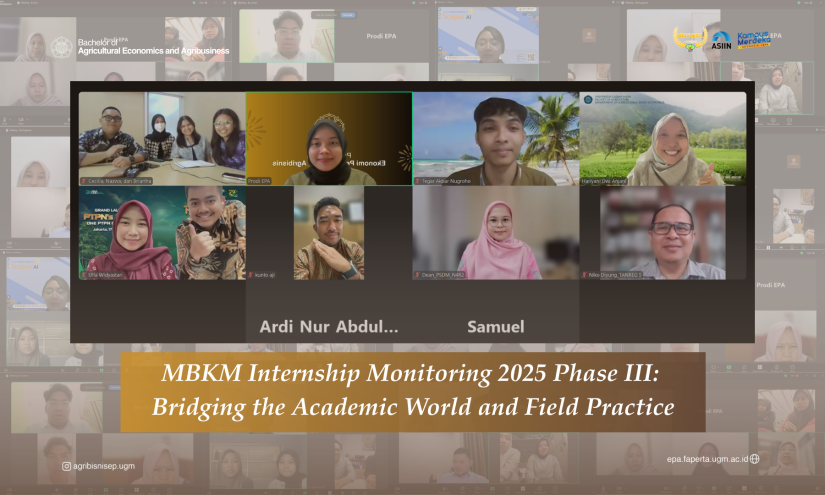
Yogyakarta, May 8, 2025—Monitoring and Evaluation (Monev) Phase III for students participating in the Merdeka Learning Campus Merdeka (MBKM) program was held on May 10, 2025, online via Zoom Meeting. Monitoring and Evaluation of the MBKM Internship scheme starts at 13.00 WIB and is attended by students, supervisors, and partner representatives. Monitoring aims to review the progress of internship implementation, evaluate learning achievements, and provide directions for improvement for a more optimal internship implementation.
Some partner agencies involved in this year’s internship activities include government agencies, state-owned enterprises, private companies, and national institutions. Students at the Agriculture and Food Security Office of Magelang Regency have completed learning in office administration and human resource management and aspects of agricultural facilities and infrastructure, with each student achieving a total of around 420 – 440 hours.
At PT Hibrida Jaya Unggul, students explore production management on the Banguntapan farm and in the warehousing area. All activities have reached around 440 hours, with a plan to complete the activity on June 12, 2025. Meanwhile, students placed at the Agriculture and Food Security Office of Yogyakarta Special Region have gone through the pre-KRS stage without any problems. The busy field activities in April are mainly related to the community.
At PT Hibrida Jaya Unggul, students explore production management on the Banguntapan farm and in the warehousing area. The entire activity has reached around 440 hours, with a plan to complete the activity on June 12, 2025. Meanwhile, students placed at the Agriculture and Food Security Office of Yogyakarta Special Region have gone through the pre-KRS stage without any problems. The busy field activities in April, especially related to coffee and tobacco commodities, broadened students’ insights into the field conditions of farmer groups and the role of the government. However, because government working hours were reduced due to national holidays and collective leave, students replaced them with independent activities and weekend work.
Students who carry out internships at PT Natural Nusantara actively contribute to creating product video content for social media marketing purposes. They also develop skills in shooting and composing visual narratives according to product characteristics. In addition to routine content production activities, students participate in thematic activities every Wednesday and Saturday. However, repetitive work patterns are one challenge in maintaining morale.
At PT Pagilaran Pusat Semarang, students created product catalogs, managed halal and MD documents, and prepared product business plans. Students who interned at Bank BPD Yogyakarta Special Region played a role in financial literacy activities for market traders, Indonesian migrant workers (TKI), and students in Sleman, with the conversion of appropriate courses. Meanwhile, at the Coordinating Ministry for Food in Jakarta, students participated in deputy meetings and assisted in implementing administrative activities within Deputy II. They also participated in activities at the Assistant Deputy in charge of horticulture competitiveness improvement policy, including compiling minutes, attendance lists, and scheduling activities.
At Perum Perhutani KPH Kedu Utara Magelang, students contributed to preparing work instructions for coffee sharing, creating and editing social media content, and documenting activities. They were also involved in visits to logging sites to learn the technicalities of felling trees on sloping land, assisting in fulfilling external audit files, understanding the ASME digital correspondence system, and recapitulating tourism revenue and insurance premiums. The activity also included learning how to buy and sell timber at the timber yard.
Overall, the internship is closely connected to various goals in the Sustainable Development Goals (SDGs), including SDG 4 (Quality Education), SDG 8 (Decent Work and Economic Growth), SDG 9 (Innovation and Infrastructure), SDG 12 (Responsible Consumption and Production), and SDG 17 (Partnerships to Achieve Goals). Through direct involvement in the public and private sectors, students gain technical experience and understand the challenges and dynamics facing Indonesia’s agriculture, food, and agribusiness sectors.
The UGM Agricultural Economics and Agribusiness Study Program hopes that this MBKM activity can continue to be improved in terms of the quality of assistance, variety of partners, and integration of learning. The hope is that students will be able to link field experience with academic theories obtained on campus and build readiness and competitiveness in a dynamic and complex world of work. With the spirit of collaboration and adaptive learning, this program is expected to be a real bridge between higher education and contribution to sustainable national development.
Author : Aprilia Dwi Hastuti
Admin of the Website for the Agricultural Economics and Agribusiness, Faculty of Agriculture, UGM
